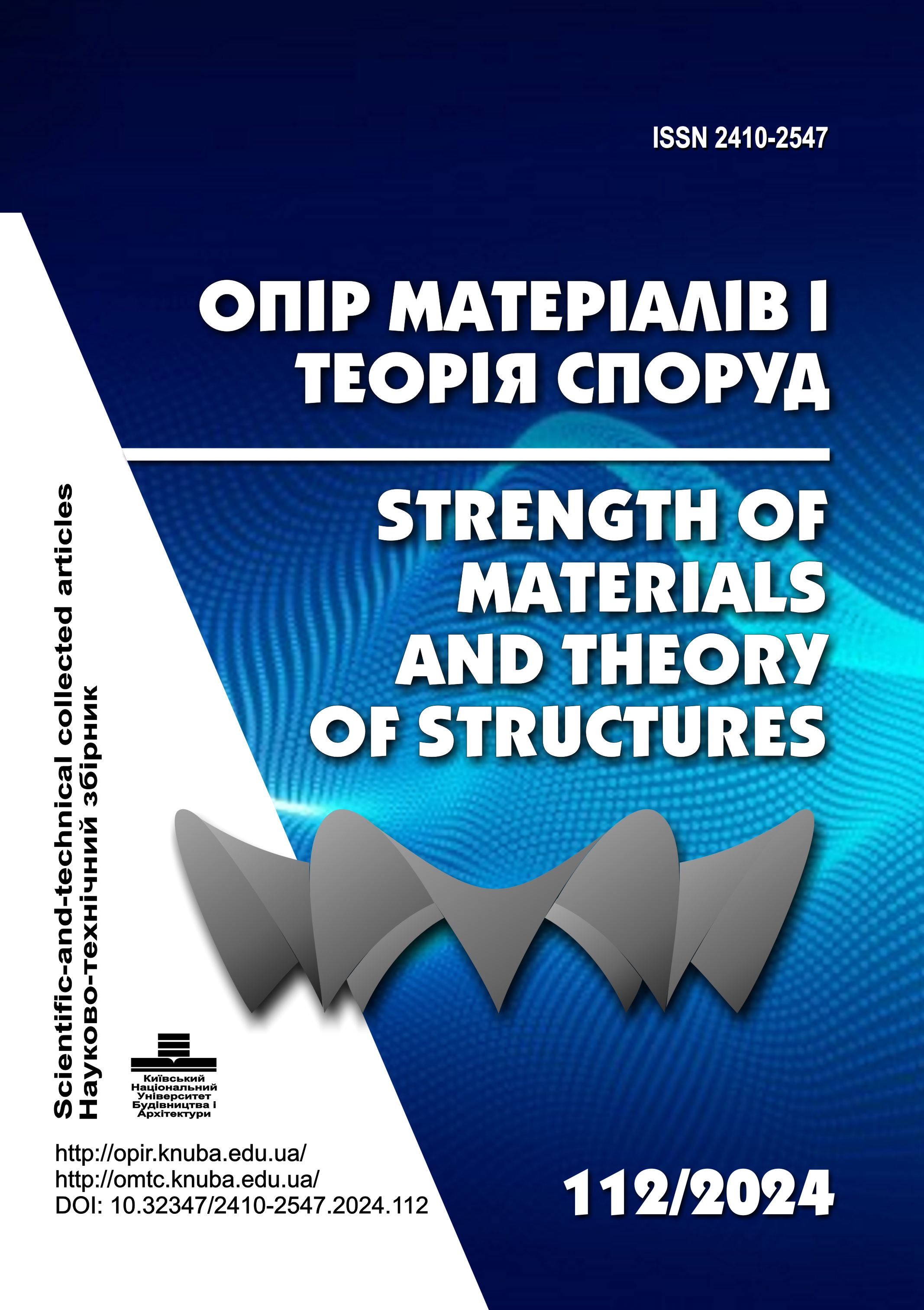Analysis of the stress-strain state of the rotary device fastening part by the semi-analytical finite element method
DOI:
https://doi.org/10.32347/2410-2547.2024.112.67-74Keywords:
finite element method (FEM), semi-analytical finite element method (SA FEM), stress-strain state (SSS), elastic deformation, rotary device fastening part, cylindrical body, sampling, elastoplastic formulationAbstract
The possibilities of the numerical apparatus developed on the basis of the semi-analytical finite element method are shown on the example of solving a specific problem. In the areas of maximum values, the parameters of the stress-strain state of the re-device fastening part were compared. It is worth noting the relatively complex configuration of the cross-section of the object, which led to a thorough study of the principles of constructing a grid area. The surface of interaction between the axis and the hull was modeled by a fairly thin layer of elements in relation to their thickness, which absorb only normal stresses. Analysis of the stress-strain state of the rotary device fastening part should be carried out from the standpoint of a spatial problem. Moreover, according to the results of the elastic calculation, the transition section between the body and the base plate turned out to be more loaded compared to the zone of contact interaction between the body and the axle. The data of the calculation performed in the elastic-plastic formulation made it possible to clarify the idea of the operating conditions of individual sections of the object and to draw a conclusion about the uniformity of the hull.
The carried out studies confidently demonstrated the wide possibilities of the developed approach in solving new, practically important problems of elastic deformation of prismatic bodies of complex shape in the spatial formulation of new ones. To substantiate the reliability of the results of the calculation of the elements under consideration, a sequential increase in the number of FE in the cross-section and the number of retained terms of the decomposition along the length of the body, as well as an increase in the accuracy of solving systems of equations, are given. In addition, an assessment of the satisfaction of natural boundary conditions on the surface of the body and the conditions of equilibrium in the integral sense is given according to the characteristic sections within the region, which showed their fairly good performance. New data on the regularities of behavior of critical structures in the process of loading, due to the consideration of their physical and geometric parameters, have been obtained.
References
Bazhenov V.A., Pyskunov S.O., Maksymyuk Yu.V., Mytsyuk S.V. Influence of geometric nonlinearity on the value of the Christmas tree compound resource in creep conditions / V.A.Bazhenov, S.O.Piskunov, Yu.V.Maksymyuk, S.V.Mytsyuk // International Scientific and Technical Journal "Problems of Strength". – 2022. – № 3. – P. 33–38.
Bazhenov V.A., Piskunov S.O., Maksymyuk Yu.V., Shkryl O.O. "Evaluation of the resource of the steam turbine stop valve body at thermopower load taking into account the shape change" // International scientific and technical journal "Problems of strength". – 2022. – № 4. – P. 56–64.
Bazhenov, V. A., Gulyar, O. I., Piskunov, S. O., Sakharov, O. S., [Bazhenov V. A., Gulyar O. I., Piskunov S. O., Sakharov O. S.]. Kyiv: Karavela, 2014. – 235 p.
Finite Element Method in Problems of Deformation and Destruction of Bodies of Rotation under Thermoforce Load / [Bazhenov V.A., Piskunov S.O., Maksymyuk Yu.V.] – Kyiv: Karavela Publishing House, 2018. – 316 p. (in Russian).
Semi-Analytical Method of Finite Elements in Spatial Problems of Deformation, Destruction and Shape Change of Bodies of Complex Structure / [Bazhenov V.A., Maksymyuk Yu.V., Martyniuk I.Yu., Maksymiuk O.V.] – Kyiv: Karavela Publishing House, 2021. – 280 p.
Numerical modeling of the processes of nonlinear deformation of bodies taking into account large plastic deformations / [Bazhenov V.A., Maksymyuk Yu.V., Solodey I.I., Strigun R.L.] – Kyiv: Karavela Publishing House, 2019. – 223 p. (in Russian).
A modified method for evaluating the invariant J-integral in finite-element models of prismatic bodies / V.A. Bazhenov, A.S. Sakharov, Y.V. Maksimyuk, A.A. Shkryl’ // International Applied Mechanics. – 2016. – 52(2). pp. 140-146.
Annenkov A. Monitoring the deformation process of engineering structures using BIM technologies. The International Archives of the Photogrammetry, Remote Sensing and Spatial Information Sciences, Volume XLVI-5/W1-2022 Measurement, Visualisation and Processing in BIM for Design and Construction Management II, 7–8 Feb. 2022, Prague, Czech Republic.
Bazhenov V.A., Shkril’ А.A., Maksimyuk Yu.V., Martyniuk I.Yu., Maksimyuk О.V. Semi-analytical method of finished elements in elastic and elastic-plastic position for curviline prismatic objects/ V.A. Bazhenov, А.A. Shkril’, Yu.V. Maksimyuk, I.Yu. Martyniuk, О.V. Maksimyuk // Strength of Materials and Theory of Structures: Scientific-&-Technical collected articles – Kyiv: KNUBA, 2020. – Issue 105. – P. 24-32.
Isaev O., Annenkov A., Demianenko R., Chulanov P.. Monitoring of the elements stability of building constructions by means of example of vertical elastic rod of high flexibility. Strength of Materials and Theory of Structures. No. 109 (2022). 416-425.
Downloads
Published
Issue
Section
License

This work is licensed under a Creative Commons Attribution 4.0 International License.
Authors retain copyright and grant the journal right of first publication with the work simultaneously licensed under a Creative Commons Attribution License that allows others to share the work with an acknowledgement of the work's authorship and initial publication in this journal.

